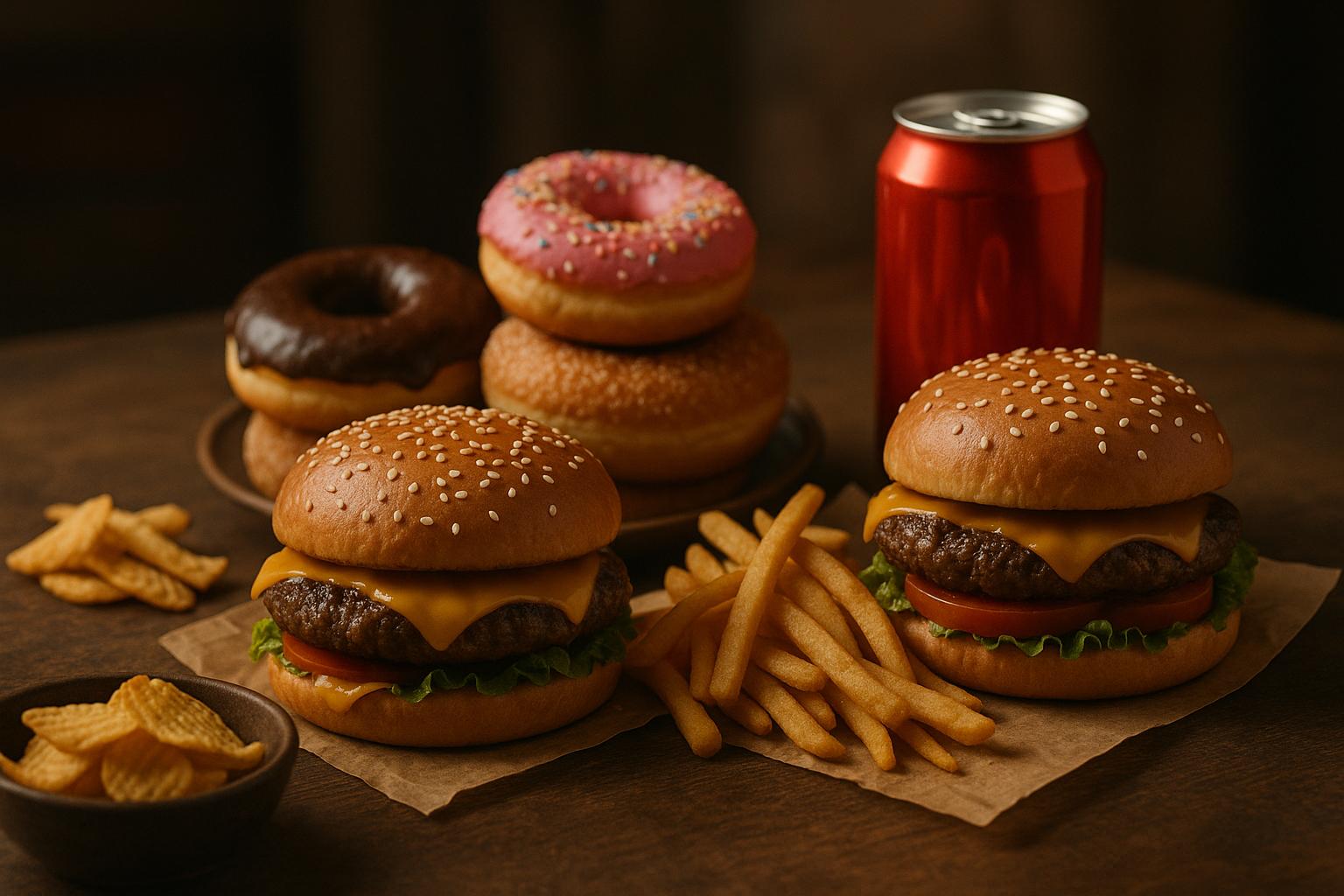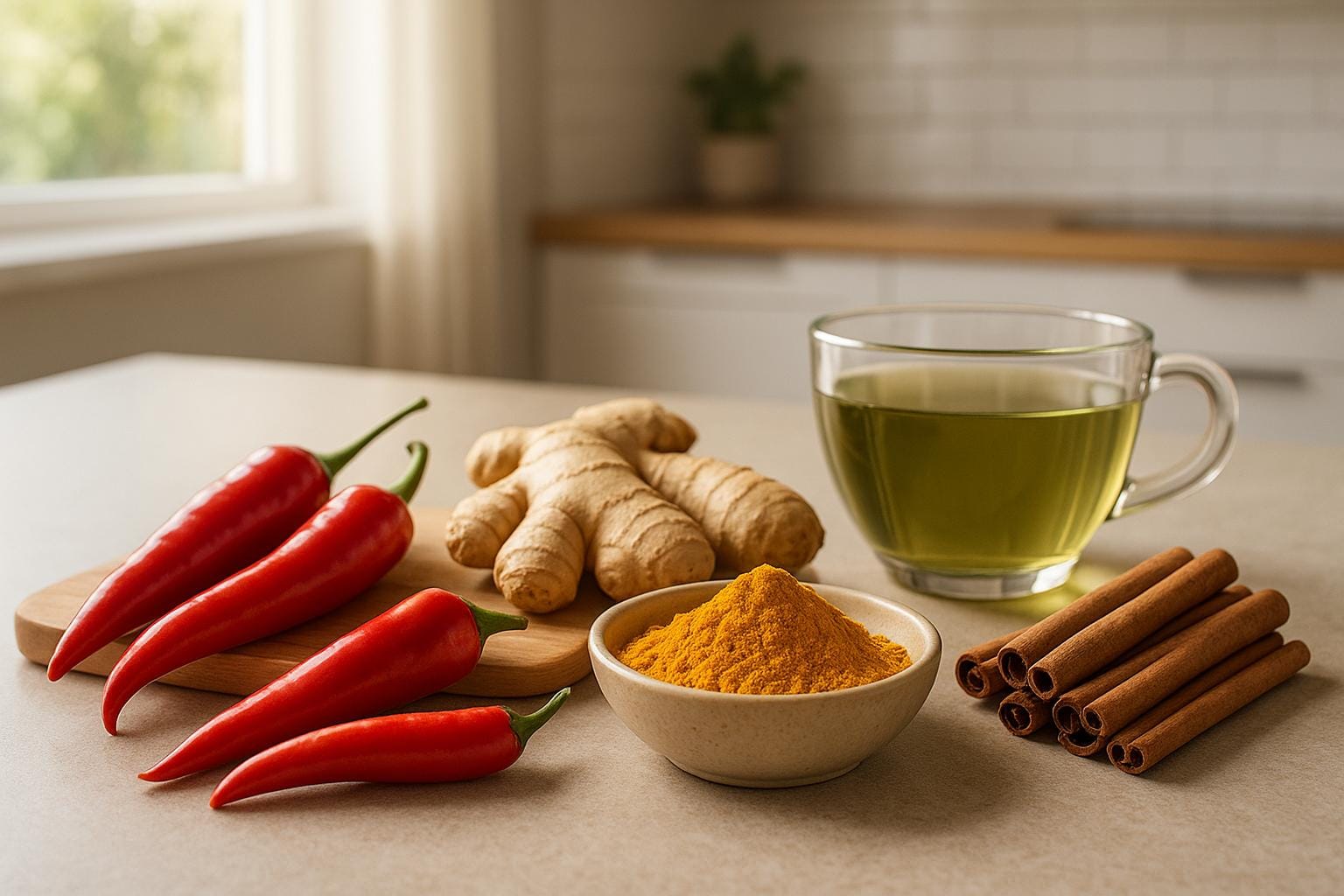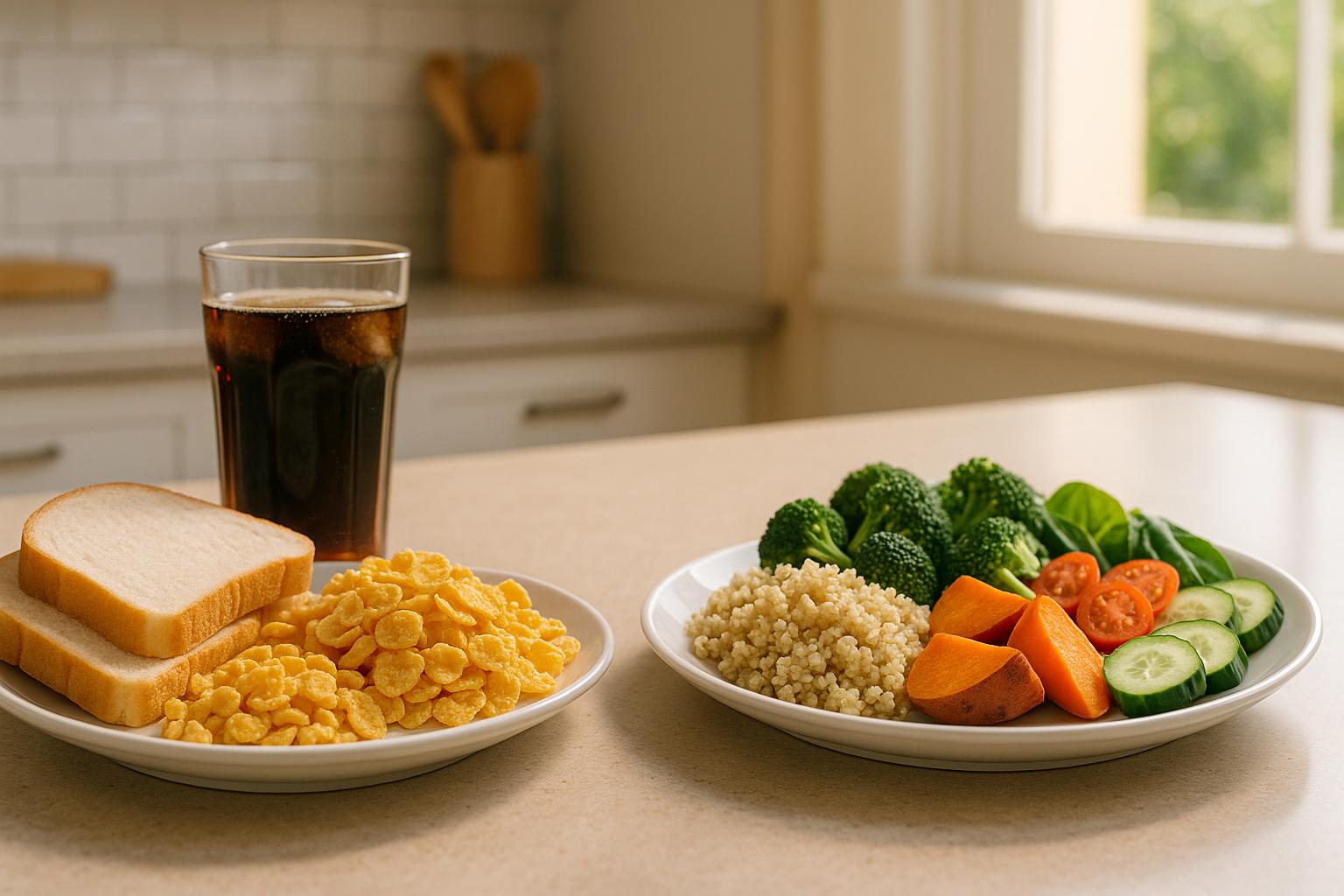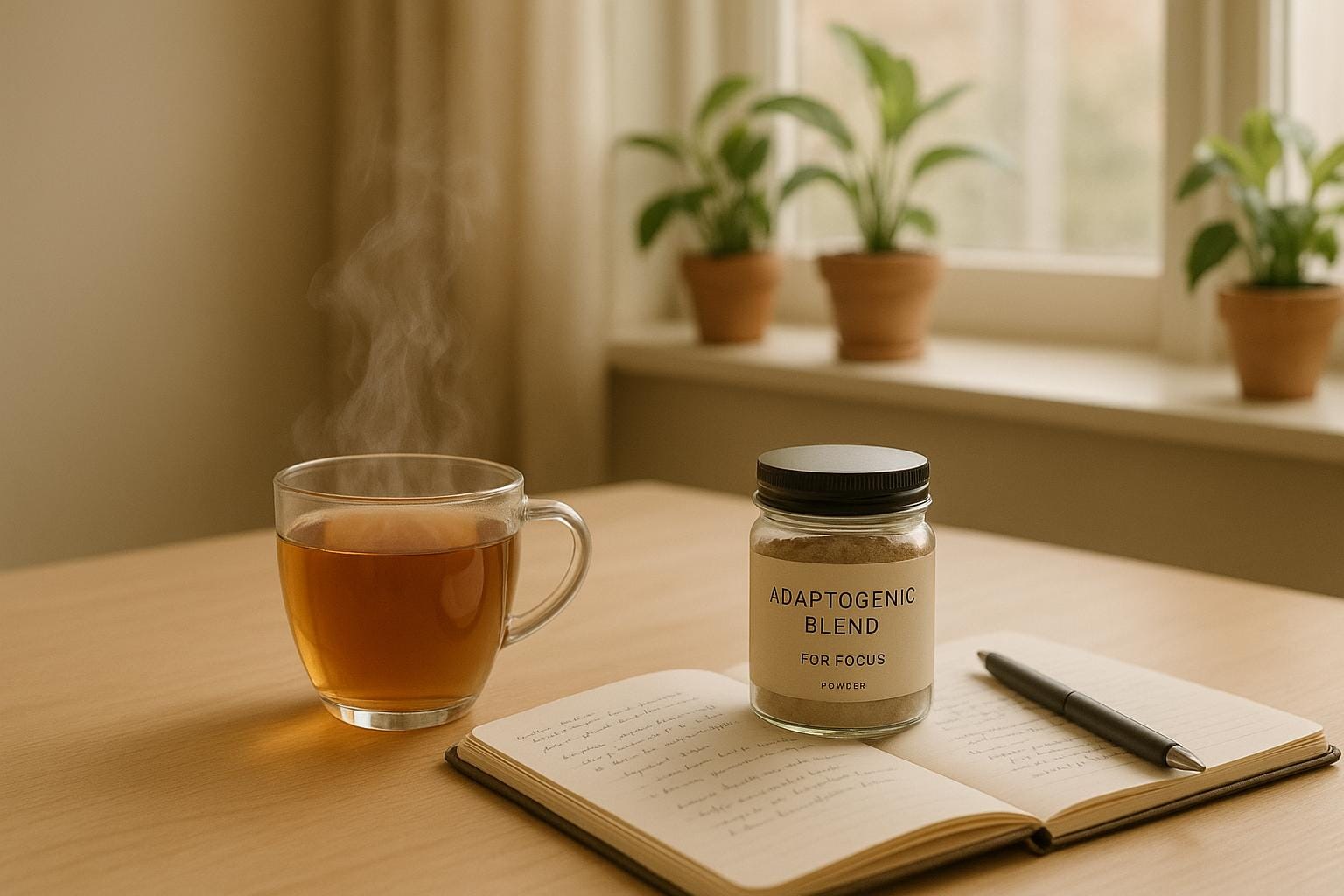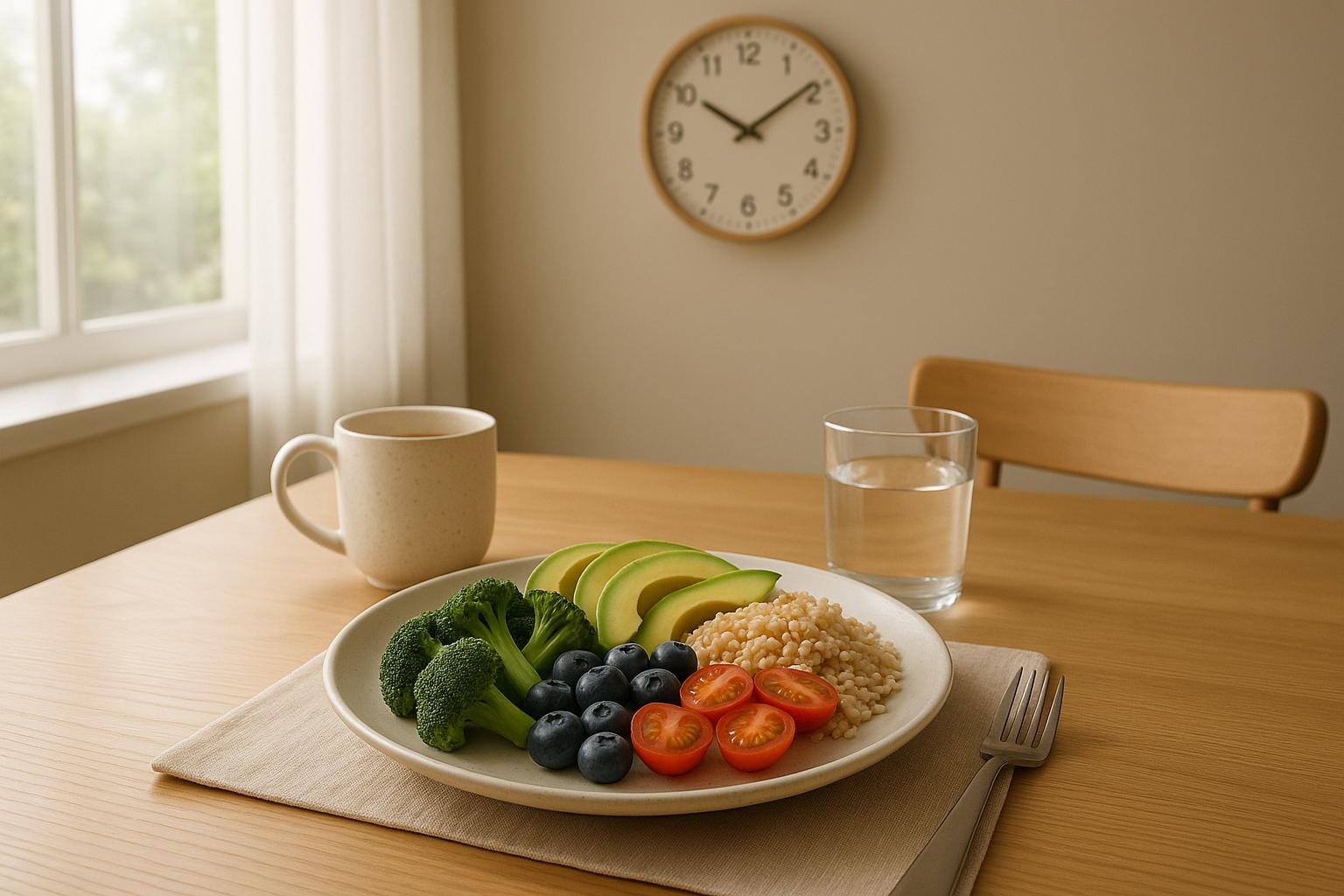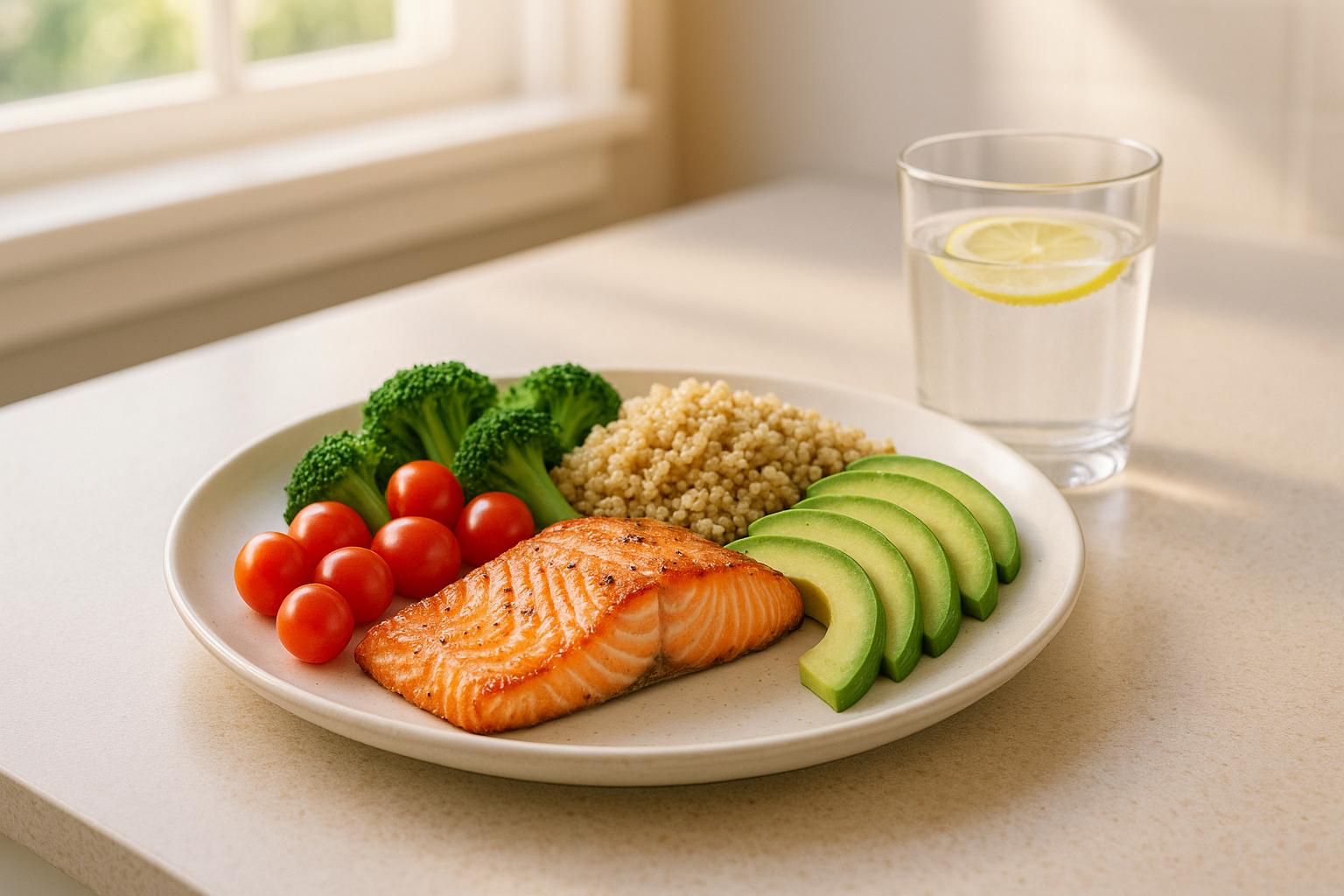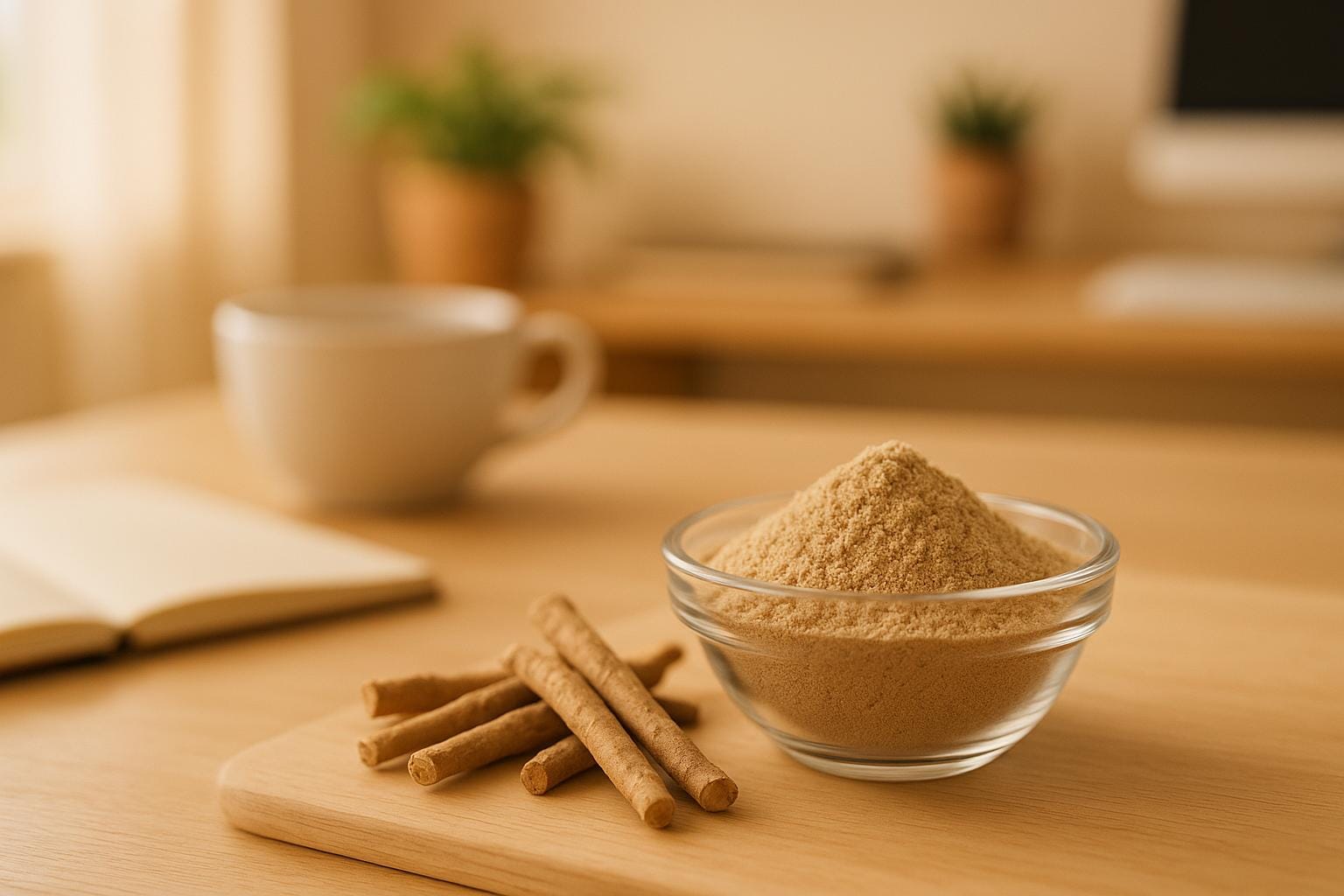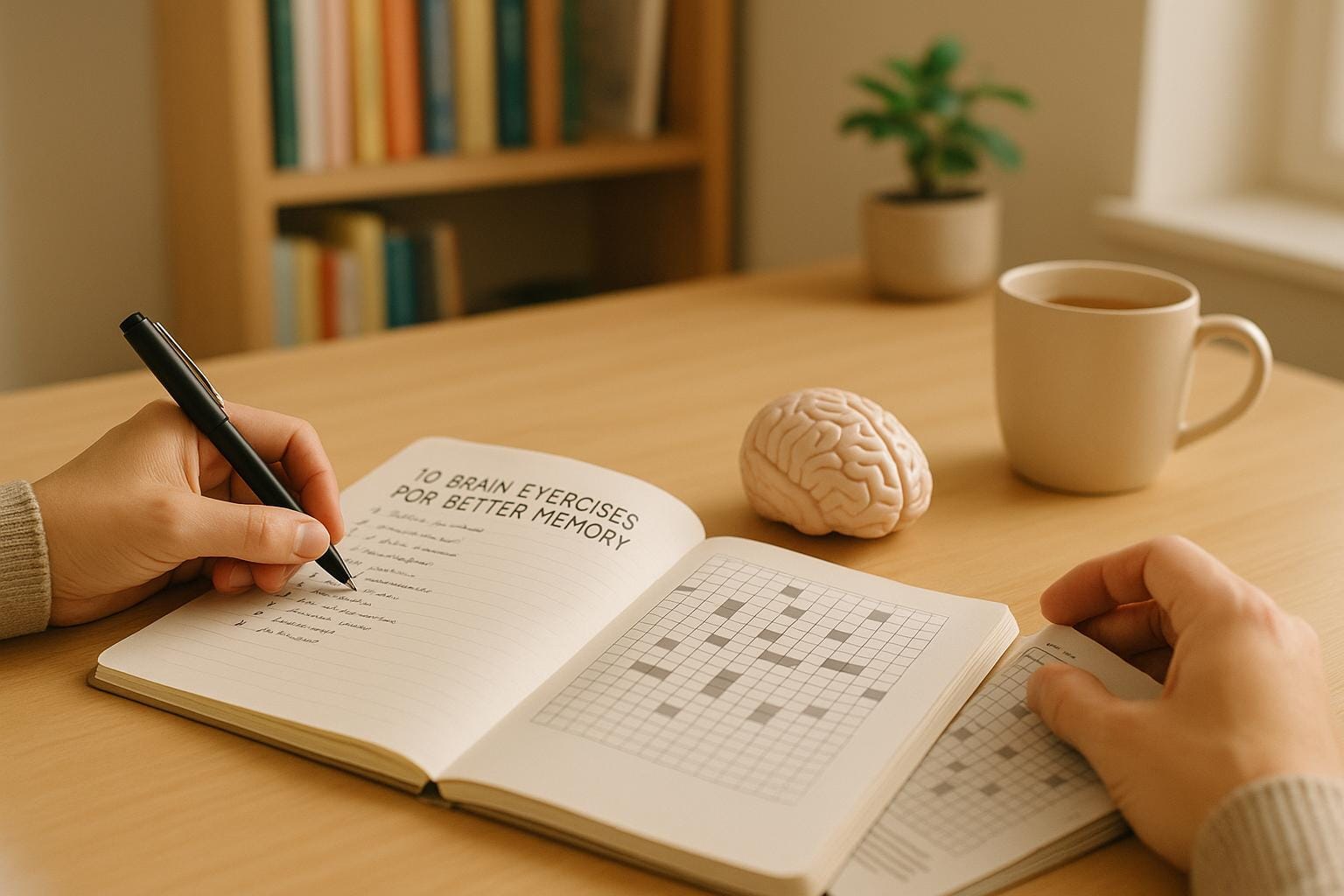When it comes to stress and anxiety, what you eat matters. Certain foods can worsen your mood, disrupt your gut-brain connection, and even trigger stress responses. Here's a quick look at the worst offenders:
- Alcohol: Initially relaxing but worsens anxiety over time and disrupts brain chemicals.
- Caffeine/Energy Drinks: Overconsumption can heighten anxiety and cause mood swings.
- Processed Foods: High in artificial additives that harm mental health.
- Fried Foods: Linked to a higher risk of depression and anxiety.
- Sugar: Causes mood swings and emotional instability.
- Artificial Sweeteners: May alter brain function and increase anxiety.
- High-Sodium Foods: Excess salt can disrupt mood regulation.
Instead of these, opt for whole, nutrient-rich foods like fatty fish, leafy greens, and fermented foods to support emotional balance. Small changes in your diet can make a big difference in how you feel mentally.
AVOID These 5 Foods If You Suffer From Anxiety
Top Stress-Triggering Foods
What we eat doesn’t just affect our physical health - it also plays a big role in how we feel mentally. Some foods can disrupt the delicate connection between the gut and brain, sparking stress and anxiety. Knowing which foods to watch out for can help us make better choices for our mental well-being.
Alcohol's Impact on Stress
Alcohol might feel like a quick fix for stress, but its effects are short-lived - and often backfire. While it may initially create a sense of relaxation, alcohol is a depressant that can intensify anxiety over time. Dr. Tyler Trahan explains:
"Anxiety is a common feeling when people drink too much. And for people who are already prone to depression and anxiety, alcohol can worsen symptoms of those conditions".
In fact, around 20% of individuals with social anxiety disorder also struggle with alcohol dependence. Once the alcohol wears off, the brain scrambles to regain balance, which can lead to heightened anxiety lasting up to 24 hours. Heavy drinking also depletes GABA, a calming neurotransmitter, leaving the brain more vulnerable to tension and even panic attacks. Similarly, stimulant beverages can amplify stress responses.
Caffeine and Energy Drinks
Caffeine is everywhere - from your morning coffee to energy drinks promising a quick boost. But while caffeine can help you stay alert, too much of it can trigger or worsen anxiety. The energy drink market alone is expected to grow by 7.9% annually between 2024 and 2030, reflecting just how popular these beverages have become.
Let’s break it down:
| Beverage Type | Typical Caffeine Content | Daily Safe Limit |
|---|---|---|
| Regular Coffee | ~100 mg per cup | 400 mg |
| Energy Drink (17 fl oz) | 160–400 mg | 400 mg |
Experts highlight the risks:
"Caffeine is one of the most widely consumed stimulants in the world. While it's known for its ability to boost alertness and energy, it can also have significant effects on your mental health, particularly if you have anxiety".
Processed Foods and Mental Health
Highly processed foods, which make up a staggering 37% of daily energy intake across 28 countries, can also take a toll on mental health. These foods are often loaded with artificial additives that you’d never use in your own kitchen. While convenient, they may contribute to mental strain and affect brain function over time.
Fried Foods and Brain Health
Fried foods are another culprit when it comes to stress and mental health issues. Research involving over 140,000 participants found that regularly eating fried foods is linked to a 12% higher risk of anxiety and a 7% higher risk of depression. Nutritionist Rohini Bajekal comments:
"The results of this study are in line with what we would expect to see and are further confirmation of decades of research showing that fried and unhealthy foods in the standard Western diet increase the risk of common chronic diseases and mental health conditions".
Sugar's Effect on Mood
Sugar might give you a quick energy boost, but it can wreak havoc on your mood. High sugar intake has been tied to mood swings and emotional instability. However, Dr. Nicole Lippman-Barile cautions against oversimplifying the connection:
"Depression is a multifactorial disease with many different variables that contribute to its presentation in an individual. It's an inaccurate and simplified narrative to say that one food is linked to depression [or anxiety]".
This article is for informational purposes only and is not intended as medical advice. Please consult a healthcare professional before starting any new fitness or wellness routine.
Harmful Food Additives
The foods we eat don’t just impact our physical health - they can also play a role in how we handle stress and anxiety. Some additives hidden in everyday products may actually worsen these mental health challenges.
Artificial Sweeteners
Artificial sweeteners, such as aspartame, have been linked to negative effects on mental health. Research indicates that aspartame can trigger anxiety-like behavior in mice by altering gene expression in the amygdala, the part of the brain that processes emotions. To put it into perspective, a 12-ounce can of diet soda contains around 200 mg of aspartame, while the FDA advises a daily limit of 50 milligrams per kilogram of body weight. Despite these guidelines, about 41.4% of U.S. adults regularly consume artificial sweeteners.
"The amount of aspartame consumed by the mice in our study was representative of the amount consumed by some individuals: two to four small, 8‑ounce cans of aspartame‑sweetened diet soda per day."
These findings suggest that even common additives like aspartame could subtly affect mental health over time.
High-Sodium Foods
Salt, another common additive, may also disrupt mood regulation. A large-scale study involving 444,787 adults found that frequently adding salt to meals increases the risk of anxiety by 17%.
"We are what we eat, and understanding how high‑salt food changes our mental health is an important step to improving well‑being. We know that eating too much salt damages our heart, blood vessels, and kidneys. This study now tells us that high salt in our food also changes the way our brain handles stress."
The average American consumes more than 3,400 mg of sodium daily, far exceeding the recommended limit of 2,300 mg. This excess sodium could activate the body’s stress response and interfere with neurotransmitters that help regulate mood.
Diet Soda Effects
Diet sodas combine two problematic ingredients: artificial sweeteners and caffeine. Together, these can negatively impact mood. Studies reveal that regular diet soda drinkers have a 26% higher risk of depression.
"These findings do make me think twice before consuming Diet Coke or other products containing aspartame."
"The key here is to consume them occasionally and aim to still prepare a healthy diet prepared from natural ingredients."
To protect your mental well-being, it’s worth checking food labels for potentially harmful additives. Here are a few to watch out for:
| Additive Type | Common Names | Found In |
|---|---|---|
| Artificial Sweeteners | Aspartame, Sucralose | Diet sodas, sugar-free products |
| Preservatives | Parabens, Polysorbate 80 | Packaged foods, condiments |
| Flavor Enhancers | MSG (Monosodium Glutamate) | Processed snacks, seasonings |
Remember, this article is for informational purposes only. Always consult a healthcare professional before making changes to your diet or wellness routine.
Better Food Choices for Stress Relief
Once you've pinpointed foods that might trigger stress, it's time to focus on those that can help ease it. Certain nutrients have been shown to reduce anxiety and promote emotional balance. These foods work by stabilizing blood sugar levels and reducing inflammation, directly addressing some of the effects we discussed earlier.
Calming Drinks
Instead of reaching for caffeinated drinks or diet sodas, consider these soothing alternatives. Herbal teas like chamomile and lavender are well-known for their relaxing effects on the nervous system. If you prefer something with a little caffeine, green tea is a great option. It contains less caffeine than coffee and is packed with antioxidants that help regulate cortisol levels.
"We're understanding more and more just how much food influences the body. There's clear medical evidence that nutrition affects our emotional well-being and can reduce the risk of anxiety." – Melissa Young, MD, Functional Medicine Specialist
A warm cup of herbal or green tea can be a simple yet effective way to calm your nerves, setting the stage for healthier snack options.
Natural Snack Options
When stress strikes, nutrient-rich snacks can help keep your emotions in check. Here are a few great choices:
| Snack Option | Key Benefits | Recommended Serving |
|---|---|---|
| Dark Chocolate (70%+) | Boosts serotonin levels | 1–2 squares (1 oz) |
| Greek Yogurt with Berries | Provides probiotics and antioxidants | 6 oz yogurt + ½ cup berries |
| Almonds or Walnuts | High in magnesium and omega-3s | ¼ cup (1 oz) |
| Whole-grain Crackers with Hummus | Helps stabilize blood sugar | 6–8 crackers + 2 tbsp hummus |
These snacks aren’t just tasty - they also help your body handle stress more effectively.
Foods That Reduce Stress
Incorporating whole foods rich in omega-3s, calcium, and vitamins into your diet can further lower stress levels. Research has shown that omega-3 fatty acids, for example, can reduce cortisol levels by up to 33%.
"Eating a healthy diet can reduce the negative effects of stress on your body. A healthy diet builds a solid, more enduring foundation for your body by reducing oxidation and inflammation and by helping to reduce weight gain." – Matthew J. Kuchan, Ph.D., Senior Research Scientist at Abbott
A 2022 study involving over 1,200 college students found that increasing calcium intake through dairy products helped lower stress and improve emotional resilience. Here are some standout stress-reducing foods:
- Fatty Fish: Salmon and mackerel are excellent sources of omega-3 fatty acids.
- Oysters: Just three ounces provide 291% of your daily zinc needs.
- Citrus Fruits: A single medium orange delivers over half of your daily vitamin C.
- Leafy Greens: Packed with B vitamins and magnesium to support emotional health.
- Fermented Foods: Promote gut health with probiotics, which can have a calming effect.
By choosing these whole foods, you can create a diet that not only nourishes your body but also helps it better manage stress.
Disclaimer: This article is for informational purposes only and is not intended as medical advice. Please consult a healthcare professional before starting any new fitness or wellness routine.
Conclusion: Creating a Low-Stress Diet
The link between what we eat and how we feel mentally is undeniable. Studies reveal that sticking to a whole-food-based diet can lower the risk of anxiety and depression by 25-35%. On the flip side, a diet packed with processed foods, like the standard American diet, can increase these symptoms by as much as 70%.
A low-stress diet isn’t just about cutting out junk - it’s about swapping harmful foods for nutrient-packed options. The gut-brain connection highlights how our food choices shape our mood, behavior, and even how we handle stress. Harvard Health puts it plainly:
"What you eat directly affects the structure and function of your brain and, ultimately, your mood".
Karen Hemmes, a registered dietitian, adds:
"Many of the foods we consume for comfort, such as processed meats, sugary foods, caffeine and alcohol, may worsen stress and anxiety. These foods can increase cortisol, our primary stress hormone, and contribute to various health problems".
The numbers back this up. According to the 2019 "United States of Stress" survey, 35% of Americans reported extreme stress levels, and 22% admitted to using food as a way to cope. Instead of reaching for processed snacks during tough times, consider stocking your kitchen with whole foods that promote emotional balance.
Start small. Gradually add more whole foods, cut back on processed items, and pay attention to how these changes influence your mood. As Dr. Bonnie J. Kaplan explains:
"We have evolved to need at least 30 micronutrients [minerals and vitamins] plus essential fatty acids every minute of every day".
Making thoughtful food choices doesn’t just boost your physical health - it strengthens your emotional well-being too. By staying consistent and allowing yourself some flexibility, you can create habits that support mental health through nutrition.
This article is for informational purposes only and is not intended as medical advice. Please consult a healthcare professional before starting any new fitness or wellness routine.
FAQs
Can artificial sweeteners like aspartame increase anxiety or affect mental health?
Research indicates that artificial sweeteners, particularly aspartame, could have a negative influence on mental health, potentially increasing anxiety levels. Findings suggest that aspartame might interfere with the brain's neurochemical balance and elevate stress hormones, which could make anxiety symptoms worse. It’s also been linked to changes in the amygdala - the brain region responsible for managing emotions - with some of these effects potentially lingering over time.
For individuals already dealing with mental health challenges, the impact of aspartame might be even more pronounced. If you're navigating stress or anxiety, cutting back on artificial sweeteners might be a small but meaningful step to consider for better mental health. While additional research is necessary, being mindful of aspartame consumption could play a role in emotional well-being.
How can I shift from eating processed foods to a diet that supports better mental health?
Switching to a diet that nurtures mental health doesn’t have to be overwhelming. Start with small, practical changes. Incorporate more whole foods - think fruits, vegetables, whole grains, and lean proteins - into your daily meals. These foods are rich in nutrients like omega-3 fatty acids, antioxidants, and essential vitamins, all of which play a role in reducing stress and boosting brain function.
A little planning can go a long way. Meal prepping ensures you have healthy options ready when life gets busy. Stock up on snacks like nuts, seeds, or fresh fruit to curb the temptation of processed foods. Also, don’t underestimate the power of hydration and regular eating patterns - both help stabilize blood sugar levels, keeping your energy steady and your mood balanced.
Gradually swapping out processed foods for wholesome choices won’t just improve your physical health; it can also have a lasting positive impact on your mental well-being.
How does caffeine worsen anxiety, and what are some tips for managing it?
Caffeine has a knack for stirring up anxiety because it revs up the central nervous system. By blocking adenosine - a chemical that helps you relax - it boosts alertness and energy levels. While this might sound like a productivity hack, for some people, it can bring on unwanted side effects like restlessness, a racing heartbeat, and jitteriness. If you're already prone to anxiety, these effects can feel even more intense.
If caffeine is making you feel on edge, consider cutting back slowly to avoid withdrawal symptoms like headaches or irritability. Pay attention to all the sneaky sources of caffeine in your diet, including coffee, tea, energy drinks, and even chocolate. Keeping your caffeine intake at a moderate level can help tone down those anxiety-triggering effects while still letting you enjoy your go-to pick-me-ups.


